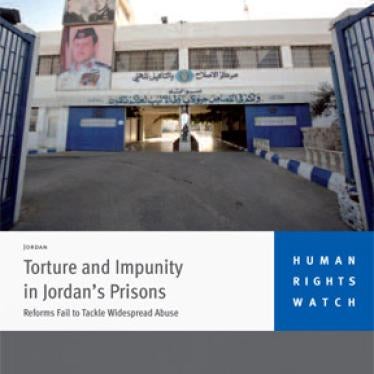Jordan’s Public Security Directorate has derided Human Rights Watch’s finding in an October 2008 report of “widespread and routine” torture in Jordanian prisons. The PSD contends that Human Rights Watch used a flawed methodology and pursued some unspecified “political goals” in preparing the report, Torture and Impunity in Jordan’s Prisons. The PSD insists its prisons are model rehabilitation facilities with excellent services and activities.
These accusations are not only false, but they also show that the PSD fails to grasp the dangerous reality of life inside its prisons. This is why outside, independent investigators are needed to unravel the tale PSD tells of model prisons, and to reveal and monitor the real extent of abuse.
The PSD spokesperson, Muhammad al-Khatib, faulted Human Rights Watch’s methodology in our visits to seven of Jordan’s 10 prisons, contending that our sample of interviews with 110 prisoners was too small, and too selective. Our report makes clear, however, that we did not pre-select prisoners to interview but, rather, randomly selected them. We did not choose inmates with prior complaints about torture, we did not ask leading questions about physical abuse, and we corroborated allegations by cross-checking accounts from other prisoners.
In our random sample 55 percent of prisoners interviewed made credible allegations of ill-treatment, often rising to the level of torture. Our interviews with 110 individuals chosen randomly give us a high level of confidence that our findings speak to a situation beyond our sample.
We did specifically ask to speak to two large groups of inmates, Islamist (Tanzimat) prisoners and administrative detainees, but we also randomly selected those we spoke to among them. Administrative detainees complained slightly less of torture than the average incidence, whereas Tanzimat prisoners complained slightly more. The PSD deputy director, Khalid Sa’idat, contended to Human Rights Watch that the Tanzimat prisoners invent torture allegations because they dislike the institutions of the Jordanian state. However, we witnessed physical signs of recent torture among more Tanzimat prisoners than among ordinary prisoners we saw, leaving little doubt to their claims.
Sharif al-‘Umari, the head of the prison service, said that Human Rights Watch’s report was “a political tool … in the service of the political goals of donor agencies supporting the organization.” As al-‘Umari knows, Human Rights Watch is an independent, non-political organization that accepts no funding from any government. We discussed our preliminary findings with Jordanian officials on several occasions, but only heard these accusations of politicization once we made these findings public.
Unlike officials in the Prime Ministry and the National Center for Human Rights, who listened with interest to Human Rights Watch’s recommendations and acknowledged the need for action, the PSD once again reacted to criticism by denying all wrongdoing. If there were torture in the prisons, the prisoners could complain and the PSD would investigate, said Mahir Shishani, the head of the PSD’s Grievances and Human Rights Office. Shishani added that his staff received very few complaints of abuse.
But as our report makes clear, the system for handling complaints from prisoners and investigating allegations of torture is inadequate. Prisoners do not often complain of ill-treatment to Grievances officials because they do not trust them—with good reason. Officials protect neither victims of torture nor witnesses to torture.
In fact, the Grievances office does not remove officials accused of torture from contact with prisoners. It has taken no action against prison guards who have beaten, threatened and intimidated prisoners to dissuade them from making complaints or testifying against guards. Mahir Shishani and his men wear the same uniform as the prison officials. In the few cases where they have investigated and prosecuted guards, the victims had been tortured to a degree requiring hospitalization. In more than one case, guards have tortured inmates to death.
Jordan needs an independent and effective mechanism to receive and speedily investigate complaints of torture. Civilian prosecutors and judges, not police officers at the Police Court, should try these crimes when the evidence warrants.
Some officials tried to explain and excuse torture as a Jordanian “cultural” phenomenon. Human Rights Watch disagrees. It is lack of punishment for abusers, and not any cultural attributes, that stymies efforts to eradicate torture. Independent investigators who know how to arrive at the truth, and civilian prosecutions that hold accountable torturers, including those within the PSD’s ranks, are the right tools to end this practice.
*Christoph Wilcke is researcher for Jordan at Human Rights Watch and author of the report.







